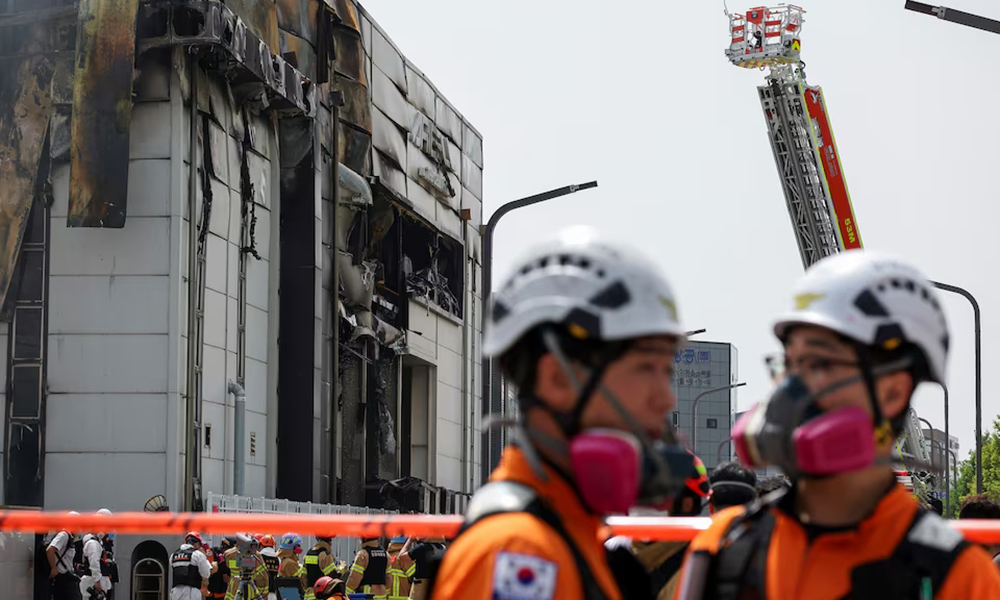World
Blaze at South Korea lithium battery plant kills 22 workers
South Korea is home to major producers of lithium-ion batteries that power electric vehicles (EVs) and to one of the world’s biggest automakers, Hyundai Motor, and its affiliate Kia (000270.KS), opens new tab, which are making a push to shift away from internal combustion cars to EVs.

A lithium battery factory in South Korea was set on fire after multiple batteries exploded on Monday, killing 22 workers, most of them Chinese nationals, fire officials said.
The fire and a series of explosions ripped through the factory run by primary battery manufacturer Aricell in Hwaseong, an industrial cluster southwest of the capital Seoul, Reuters reported.
The victims likely succumbed to extremely toxic gas within seconds of the blaze getting out of control, the officials said. It was unclear what caused the explosions and the fire was largely extinguished in about six hours.
Eighteen Chinese workers, two South Koreans and one Laotian were among the dead. The nationality of the other deceased worker was yet to be confirmed, Kim Jin-young, an official at the Hwaseong fire service, told reporters, citing information from company officials.
The blaze was first reported at 10:31 a.m. (0131 GMT) after a series of battery cells exploded inside a warehouse of 35,000 batteries, Kim said.
A Reuters journalist saw firefighters moving up to six bodies out of the factory. Due to the intensity of the blaze, rescuers were finding it difficult to identify the dead, Kim said.
Two people were being treated for major burns, officials at the scene said.
Live TV footage showed firefighters spraying the damaged steel and concrete building. Parts of the upper level had collapsed, and large chunks of the building looked like they had been blown out into the street by explosions, read the report.
Aerial footage showed massive white smoke clouds billowing from the structure and explosions rolling through the building.
Gyeonggi province fire official Cho Sun-ho said most of the foreign workers killed were temporary hires, likely unfamiliar with the structure of the building. Smoke and the fire blaze spread within 15 seconds and the victims likely succumbed after taking one or two breaths, he said.
HIGHLY FLAMMABLE
Kim Jae-ho, Fire and Disaster Prevention professor at Daejeon University, said the fire had probably spread too quickly for workers to escape.
“Battery materials such as nickel are easily flammable,” he said. “So often, there is not enough time to respond, compared to a fire caused by other materials.”
South Korea’s President Yoon Suk Yeol visited the scene of the accident later on Monday. Interior Minister Lee Sang-min called on local authorities to take steps to prevent any hazardous chemicals from contaminating the surrounding area, Reuters reported.
Established in 2020, South Korea-based Aricell makes lithium primary batteries for sensors and radio communication devices. It has 48 employees, according to its latest regulatory filing and its Linkedin profile.
Calls to Aricell offices were unanswered.
The company is not listed on South Korea’s stock market but is majority owned by S-Connect, according to Aricell’s regulatory filing. S-Connect is registered on the junior Kosdaq index and its shares closed down 22.5%.
Battery production involves the use of highly toxic materials.
“The fact that there were so many casualties when this was on only the second floor is because of the toxic materials and not so much because of burns,” said Park Chul-wan at Seojeong University.
South Korea is home to major producers of lithium-ion batteries that power electric vehicles (EVs) and to one of the world’s biggest automakers, Hyundai Motor, and its affiliate Kia (000270.KS), opens new tab, which are making a push to shift away from internal combustion cars to EVs.
Two years ago South Korea brought in legislation to punish the executives of a company in the event of a fatal accident with possible jail terms after the country saw dozens of workers killed in industrial accidents each year.
World
Venezuela-US tensions spike in wake of seized tanker as Nobel winner vows change

Venezuelan opposition leader Maria Corina Machado on Friday promised political change after slipping out of the country in secret to collect the Nobel Peace Prize, as the shock waves intensified from the Trump administration’s seizure of an oil tanker earlier this week.
That escalation came on the heels of a large-scale U.S. military buildup in the southern Caribbean as President Donald Trump campaigns to oust Venezuelan leader Nicolas Maduro, pushing relations to their most volatile point in years, Reuters reported.
The effects could ripple through the region, with Venezuelan oil exports falling sharply and crisis-stricken Cuba, already straining to power its grid, at risk of losing supply.
The U.S. seizure of the Skipper tanker off Venezuela’s coast on Wednesday marked the first U.S. capture of Venezuelan oil cargo since sanctions were imposed in 2019.
The vessel is now heading to Houston, where it will offload its cargo onto smaller ships, Reuters reported.
The Trump administration does not recognize Maduro, in power since 2013, as Venezuela’s legitimate leader.
Washington has signalled more seizures are planned as part of efforts to choke off sanctioned oil flows, and subsequently imposed new sanctions on three nephews of Maduro’s wife and six tankers linked to them.
The U.S. military presence in the Caribbean has grown as Trump in recent weeks has discussed potential military intervention in Venezuela, based on accusations that the country ships narcotics to the United States. The Venezuelan government has denied the accusations.
So far there have been over 20 U.S. military strikes in the Caribbean and Pacific against suspected drug vessels this year, in which nearly 90 people have been killed, alarming human rights advocates and stirring debate among U.S. lawmakers.
While many Republicans have backed the campaign, Democrats have questioned whether the campaign is illegal and urged more transparency, including the release of a full, unedited video, opens new tab of strikes on a suspected drug-trafficking boat.
MACHADO DEFIES BAN, URGES TRANSITION
Machado defied a decade-long travel ban and a period in hiding to travel to Oslo on Thursday, noting that she would soon bring the Nobel Peace Prize back home to Venezuela.
She said Maduro would leave power “whether there is a negotiated changeover or not,” vowed she is focused on a peaceful transition, and thanked Trump for his “decisive support.”
Machado is aligned with U.S. hardliners who accuse Maduro of ties to criminal networks – claims that U.S. intelligence has reportedly questioned.
When asked at a press conference in Oslo if she believed U.S. intervention was needed in Venezuela, Machado replied, “We are asking the world to help us.”
Venezuela condemned the tanker seizure as “blatant theft” and “international piracy,” saying it would file complaints with international bodies.
At the same time, Venezuelan lawmakers took a step to withdraw the country from the International Criminal Court, which is currently investigating alleged human rights abuses in the South American country.
Adding to the friction, the Venezuelan government announced the suspension of a U.S. migrant repatriation flight on Friday. A U.S. official countered that deportation flights would continue.
World
Putin arrives in Ashgabat to hold series of meetings

Russian President Vladimir Putin has arrived in Turkmenistan’s capital for a two-day visit.
According to TASS, the presidential aircraft of the Rossiya Special Flight Detachment landed near the presidential terminal of Ashgabat International Airport, commonly referred to as the “small bird” for its distinctive design.
During his visit, Putin will attend an international forum titled “Peace and Trust: Unity of Goals for a Sustainable Future” and hold several bilateral meetings.
The Kremlin has confirmed talks with Turkish President Recep Tayyip Erdogan, while the Iranian Embassy has announced that a meeting with President Masoud Pezeshkian is also planned.
The Ashgabat forum will also be attended by Turkmen President Serdar Berdymukhamedov, along with the presidents of Armenia, Iraq, Kazakhstan, Kyrgyzstan, Uzbekistan and Tajikistan, as well as the prime ministers of Azerbaijan, Hungary, Georgia and Pakistan.
World
Trump launches gold card program for expedited visas with a $1 million price tag

President Donald Trump’s administration officially launched his “Trump Gold Card” visa program on Wednesday to provide a pathway, with a steep price, for non-U.S. citizens to get expedited permission to live in the United States.
The website Trumpcard.gov, complete with an “apply now” button, allows interested applicants to pay a $15,000 fee to the Department of Homeland Security for speedy processing, Reuters reported.
After going through a background check or vetting process, applicants must then make a “contribution” — the website also calls it a “gift” — of $1 million to get the visa, similar to a “Green Card,” which allows them to live and work in the United States.
“Basically it’s a Green Card, but much better. Much more powerful, a much stronger path,” Trump told reporters at the White House. “A path is a big deal. Have to be great people.”
Commerce Secretary Howard Lutnick said some 10,000 people have already signed up for the gold card during a pre-registration period and he expected many more to do so. “I would expect over time that we’d sell, you know, thousands of these cards and raise, you know, billions, billions of dollars,” Lutnick told Reuters in a brief interview.
Lutnick said the gold card program would bring people into the United States who would benefit the economy. He compared that to “average” Green Card holders, whom he said earned less money than average Americans and were more likely to be on or have family members on public assistance. He did not provide evidence for that assertion.
Trump’s administration has pursued a broad crackdown on immigration, deporting hundreds of thousands of people who were in the country illegally and also taking measures to discourage legal immigration.
The gold card program is the Trump version of a counter balance to that, designed to make money for the U.S. Treasury in the same way the president, a former New York businessman and reality television host, has said his tariff program has successfully done.
Lutnick noted that there was also a corporate version of the gold card that allowed companies to get expedited visas for employees they wanted to work in the United States, for a $2 million contribution per employee.
-

 Sport4 days ago
Sport4 days agoILT20: Desert Vipers edge Gulf Giants in historic super over thriller
-

 Latest News2 days ago
Latest News2 days agoMuttaqi: Afghanistan’s progress requires both religious and modern education
-

 Regional4 days ago
Regional4 days agoSix Pakistani soldiers killed in TTP attack in Kurram District
-

 Business4 days ago
Business4 days agoTrade bodies warn almost 11,000 Afghan transit containers stuck at Karachi port
-

 World4 days ago
World4 days agoPowerful 7.6 earthquake hits northern Japan, tsunami warnings issued
-

 Latest News3 days ago
Latest News3 days agoTrump calls Afghanistan a ‘hellhole’ country as US expands immigration restrictions
-

 Sport5 days ago
Sport5 days agoSorkh Poshan Khafi defeats Sarsabz Yashlar 4-0 in Afghanistan Champions League
-

 Sport3 days ago
Sport3 days agoCommanding wins for Arman FC and Sarsabz Yashlar in Afghanistan Champions League
























